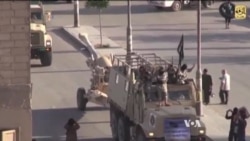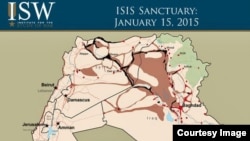U.S. intelligence and military officials say the Islamic State is losing ground in Iraq, and perhaps more.
“Its momentum has been checked and the group has suffered some notable setbacks during the last couple of months,” a U.S. official told VOA on condition of anonymity. “Mounting a major comeback to retake lost territory would be challenging under current conditions.”
Those conditions include a steady bombardment of Islamic State targets from almost daily airstrikes from the United States and other anti-IS coalition members, as well as reinvigorated Iraqi security forces and a continued push by Kurdish fighters.
And despite what the official described as “pockets of strength” in Fallujah, Ramadi and parts of other provinces, more trouble could be looming for IS, which is also known as ISIS or ISIL.
“There appears to be some dissatisfaction in the ranks now, and that could grow if battlefield strains increase,” the official said.
The assessment matches with testimony given Thursday at a Senate Armed Services Committee hearing by National Intelligence Director James Clapper, who said one effect from the airstrikes was “substantial attrition,” in that there’s evidence the Islamic State has been forced to turn to conscripts to fill its ranks.
“We are seeing anecdotal evidence of resentment and even resistance in those areas that are controlled by ISIL because of their brutal approach to enforcing Sharia,” said Clapper.
Clapper said the Islamic State was also running into trouble with finances, seeing profits decline from its illicit oil trade while donations “are tapering off" because of the group’s brutality.
Still, Clapper warned the Islamic State remains a “formidable and brutal threat” looking to spread its ideology and “create both the substance and maybe more importantly the image of this global-scale caliphate.”
At the same hearing, Defense Intelligence Agency (DIA) Director Lieutenant General Vincent Stewart remained cautious.
“I think there will be a tipping point,” Stewart said. “We just don’t know where that tipping point will be.”
U.S. military officials have said coalition airstrikes have hurt the Islamic State’s capabilities, helping the Iraqis gain back 700 to 800 square kilometers of terrain; but, those same officials have consistently described the effort to degrade and ultimately destroy the Islamic State as one that will take years. And even while suffering setbacks, the size of the Islamic State force is daunting.
U.S. intelligence officials believe the group has 20,000 to 32,000 fighters at its disposal, with some analysts saying the true number could be 50,000 or more.
Christopher Harmer at the Institute of the Study of War is among those urging caution.
“We shouldn’t confuse tactical success with the strategic changing of the tide. ISIS still has the strategic initiative,” the former Navy commander, helicopter pilot and Marine Corps infantryman said. “We’ve done nothing to reduce their heartland territory in Syria.”
He also warned that the Islamic State’s tactical setbacks have come as it attempts to operate like a conventional military force trying to secure a nation-state, which has not been the group’s strength.
“If that model fails, and I’m sure eventually it will, they’ll simply revert to a terrorist organization, at which point they’ll be the biggest, best financed, best organized, most capable terrorist organization in the world,” Harmer said.
For now, the U.S. focus is on Iraq and prepping Iraqi forces for a campaign to retake Mosul, perhaps as soon as April.
Still, there are problems.
It could be six to nine months before Iraqi forces are ready to launch an offensive on their own.
And while DIA Director Stewart acknowledged putting U.S. troops on the ground could be helpful, he said there could be a huge risk as well.
“The best propaganda victory that we could give ISIL is to make this a fight between the West and Islam,” he said.
There are other factors to consider, too, including the role of Iran, which has been actively working to spread its influence in Iraq and Syria.
U.S. intelligence officials say Iran has played a crucial role in assisting Shia militias, although they note that support comes “at a steep price,” with the militias sometimes resorting to scorched-earth tactics while working to transform themselves into capable paramilitary squads.
And then there is still the problem of the Islamic State in Syria.
“We have a lot of gaps, intelligence gaps in Syria,” National Intelligence Director Clapper told lawmakers Thursday, “principally because we're not there."






